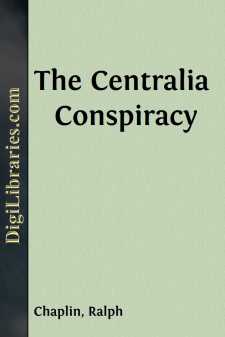Categories
- Antiques & Collectibles 13
- Architecture 36
- Art 48
- Bibles 22
- Biography & Autobiography 813
- Body, Mind & Spirit 142
- Business & Economics 28
- Children's Books 17
- Children's Fiction 14
- Computers 4
- Cooking 94
- Crafts & Hobbies 4
- Drama 346
- Education 46
- Family & Relationships 57
- Fiction 11829
- Games 19
- Gardening 17
- Health & Fitness 34
- History 1377
- House & Home 1
- Humor 147
- Juvenile Fiction 1873
- Juvenile Nonfiction 202
- Language Arts & Disciplines 88
- Law 16
- Literary Collections 686
- Literary Criticism 179
- Mathematics 13
- Medical 41
- Music 40
- Nature 179
- Non-Classifiable 1768
- Performing Arts 7
- Periodicals 1453
- Philosophy 64
- Photography 2
- Poetry 896
- Political Science 203
- Psychology 42
- Reference 154
- Religion 513
- Science 126
- Self-Help 84
- Social Science 81
- Sports & Recreation 34
- Study Aids 3
- Technology & Engineering 59
- Transportation 23
- Travel 463
- True Crime 29
Bars and Shadows
by: Ralph Chaplin
Description:
Excerpt
INTRODUCTION
I.
Ralph Chaplin is serving a twenty year sentence in the Federal Penitentiary, not as a punishment for any act of violence against person or property, but solely for the expression of his opinions.
Chaplin, together with a number of fellow prisoners who were sentenced at the same time, was accused of taking part in a conspiracy with intent to obstruct the prosecution of the war. To be sure the Government did not produce a single witness to show that the war had been obstructed by their activities; but it was argued that the agitation which they had carried on by means of speeches, articles, pamphlets, meetings and organizing campaigns, would quite naturally hamper the country in its war work. On the face of their indictments these men were accused of interfering with the conduct of the war; in reality they were sent to jail because they held and expressed certain beliefs.
As a member of the Industrial Workers of the World, Ralph Chaplin did his part to make the organization a success. He wrote songs and poems; he made speeches: he edited the official paper, "Solidarity". He looked about him; saw poverty, wretchedness and suffering among the workers; contrasted it with the luxury of those who owned the land and the machinery of production; studied the problem of distribution; and decided that it was possible, through the organization of the producers, to establish a more scientific, juster, more humane system of society. All this he felt, intensely. With him and his fellow-workers the task of freeing humanity from economic bondage took on the aspect of a faith, a religion. They held their meetings; wrote their literature; made their speeches and sang their songs with zealous devotion. They had seen a vision; they had heard a call to duty; they were giving their lives to a cause—the emancipation of the human race.
When the war broke out in Europe, with millions of working-men flinging death and misery at one another, men like Chaplin, the world over, regarded it as the last straw. Was it not bad enough that these exploited creatures should be used as factory-fodder? Must they be cannon-fodder too? Why should they fight to increase the economic power of German traders? of British manufacturers? The war was a capitalist war between capitalist nations. What interest had the workers in these nations? in their winnings or in their losses? So ran the argument.
The I. W. W. was not primarily an anti-war organization In theory it had abandoned political activity to devote itself exclusively to agitation and organization on the field of industry. Practically its funds and its energies were expended upon industrial struggles. Long before the war, the I. W. W. had made itself known and feared for its conduct of strikes, its free speech fights, and its ability to put the sore spots of American industrial life on the front page of the daily press and to keep them there until the people had become aroused to the wrongs that were being perpetrated. It was in this domain of industry that the I....



